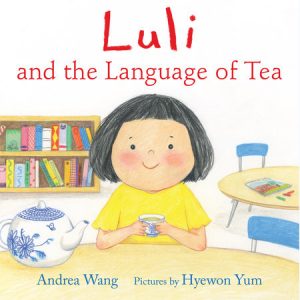 Luli and the Language of Tea
Luli and the Language of Tea
Written by Andrea Wang
Illustrated by Hyewon Yum
Neal Porter Books, 2022, 40 pp
ISBN: 978-0823446148
In the opening spread of Luli and the Language of Tea, young children are saying goodbye to their parents, then the adults walk into their English lessons and the children into childcare. Luli enters her classroom, a quiet space where none of the children speak a common language and don’t seem to play or interact with each other. On this day, however, Luli comes prepared. Following a hand-drawn plan previously shared with her teacher, she pulls out a thermos, cups, a teapot with tea and begins to fill the cups for her classmates. Once she has filled her first cup, she calls out “Cha!” in Chinese and the other children quickly begin to notice and respond with curiosity using the word for tea in each of their home languages: Russian, Hindi, Turkish, Persian, Arabic, Spanish, German, Swahili and Portuguese. As each child shares, the similarities across languages become evident. When the teapot empties just as Luli is filling the last cup for herself, her classmates—now gathered around the table together—each contribute a little of their own tea to Luli’s cup to ensure that she is able to join in. In this simple act of sharing tea, the classroom transforms from a quiet solitary space into one full of love, laughter and connection.
In writing this translingual book, Andrea Wang drew upon her own experiences as a child of Chinese immigrants, noting that seeking out common bonds was often at the heart of trying to communicate. Her father taught English as a Second Language (ESL) classes and students from many countries visited her childhood home where they were always offered tea and snacks. Andrea became intrigued that so many languages had a similar sounding word for tea and dove more deeply into this research to write Luli and the Language of Tea (Marshall, n.d.)
Illustrator Hyewom Yum, born and raised in South Korea, attended ESL classes in the U.S. as an adult and drew from her own memories of this time and what it felt like to find similarities with her classmates across perceived language barriers and age differences. Her illustrations, drawn with colored pencils, offer many small details in the children’s expressions that capture the surprise, wonder, and ultimately joy that is found in connection with one another. In the back of the book, each child from the story shares how they drink tea in their own country of origin. A map shows the location of these countries, and the endpapers offer exquisitely drawn teacups to highlight yet another example of difference as beautiful.
The simple text and warm illustrations work together to illustrate the process of true intercultural connection which honors both difference and similarity. In the early pages, the characters’ bodies depict an inward focus, heads down, shoulders slumped. As Luli offers the tea in her own unique language, she opens the possibility for others to do the same and as a result, claiming their own identity in this shared space. Across the pages, as children use their home languages, their bodies straighten, their faces turn upward and ultimately, they lean into one another, connected by the similarities within their differences.
Significant to this book are the ways that language is used throughout the text. Both Luli’s initial exclamation of “Cha!” and each child’s response is written first in the orthography of the language they are speaking, followed by an English pronunciation guide. However, an English translation is not offered, leaving the reader—like the children in the story—to draw upon a variety of context clues to derive the meaning. Luli and the Language of Tea offers a unique perspective on the power of language to connect. Rather than a focus on learning and using each other’s languages as a first step of connection, this book centers young children and their agency in connecting to others through a loud and proud declaration of their own individual home languages.
Luli and the Language of Tea could be paired with other picture books about finding connection through language, both verbal and visual, such as Alone Like Me by Rebecca Evans (2022) and Drawn Together by Minh Lê (2018). Dumplings for Lili by Melissa Iwai (2021) could also be read as a companion text to explore similarities, differences and connections through food. To create opportunities for inquiries about both familiar and unfamiliar languages, a text set could be built by adding books such as Gibberish by Young Vo (2022), A is for Bee: An Alphabet Book in Translation by Ellen Heck (2022), Du Iz Tak by Carson Ellis (2016) and Where’s Halmoni by Julie Kim (2017).
Andrea Wang’s work explores culture, creative thinking and identity. She is also the author of Watercress (2021), which won the Asian/Pacific American Award for Literature for Picture Book, Caldecott Medal, and Newbery Honor. Her other books have also received awards and starred reviews. Her work can be explored on her website.
Hyewon Yum is an author and illustrator whose books Last Night (2008), There Are No Scary Wolves (2010) and Mom, It’s my first day of Kindergarten! (2012) have won numerous awards including the Golden Kite, Ezra Jack Keats New Illustrator, and Kirkus Reviews Best Book of the Year. Visit her website to inquire more about her work.
References
Marshall, M. (n.d.). The Picture Book Buzz. Interview w/Andrea Wang & Hyewon Yum_Review Luli and the Language of Tea. https://www.mariacmarshall.com/single-post/the-picture-book-buzz-interview-w-andrea-wang-hyewon-yum_review-luli-and-the-language-of-tea
Dorea Kleker, University of Arizona, Tucson
© 2023 by Dorea Kleker

